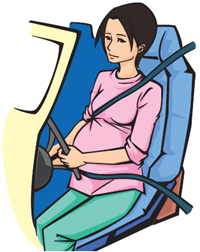The trauma of a car crash during pregnancy may lead to premature delivery, miscarriage and complications sustained from blood clots, fractures and internal injuries to organs. All of these can lead to long-term negative consequences for your unborn child.
When travelling on the road, whether it is a 30-minute trip or a 5-minute stop at a nearby supermarket, it is important to remember and practise some car safety rules in order to protect yourself and your unborn child.
- Ensure that your car comes with airbags for added protection. Seat belts and airbags work together to protect you and your unborn child in a crash
- Position the shoulder strap between the breasts and away from the neck
- Place the lap portion of the seatbelt below your abdomen and across your upper thighs
- The breastbone should be at least 25cm (about the length of your forearm) from the steering wheel or dashboard
- As your abdomen grows, move the seat back to keep as much distance as possible while your feet can still reach the pedals
| EXTRA CAUTION |
|



Comments